Pamela Geller presents herself as an expert on Islam, promoting the theory that there is an Islamic conspiracy to destroy American values.
She uses all the psychological tricks and tactics to manipulate people’s minds and persuade them to support her and her bogus cause.
Monstrous lies are being told about France, so what is the real situation?
Related: Is this the end of France? Why Pamela Geller is Fake News
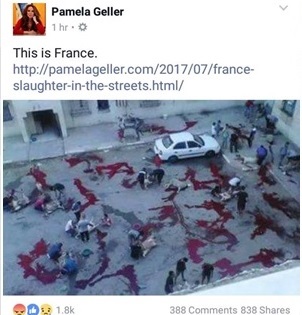
This photo was taken in Algeria on the first day of the Eid festival in Ouled Mendil, Algiers, on September 12, 2016.
The original video/photo was published in an article by Algeria-Focus. It was also posted on the Facebook page of the Algerian Special Envoys website on September 15, 2016.
Geller only aims to make people believe that this scene is in France to further exacerbate cultural tensions and provoke virulent comments.
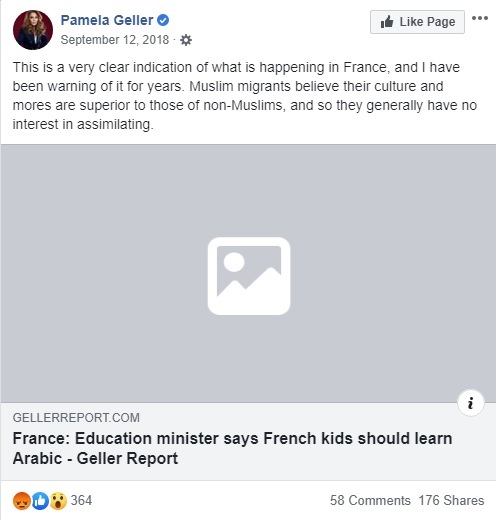
Children of Arabic speaking migrants have the option of studying Arabic in primary school after the establishment of ELCO. The original language and culture teachings (ELCO) concern nine countries: Algeria, Croatia, Spain, Italy, Morocco, Portugal, Serbia, Tunisia and Turkey.
They are implemented on the basis of bilateral agreements based on a European directive of 25 July 1977 on the schooling of children of migrant workers.
These optional courses are offered outside school hours, and the teachers provided by the nine countries concerned, are not paid by the government or the taxpayer but by the country of origin.
Arabic is also an option that is available in some schools for French children to choose as a second language:
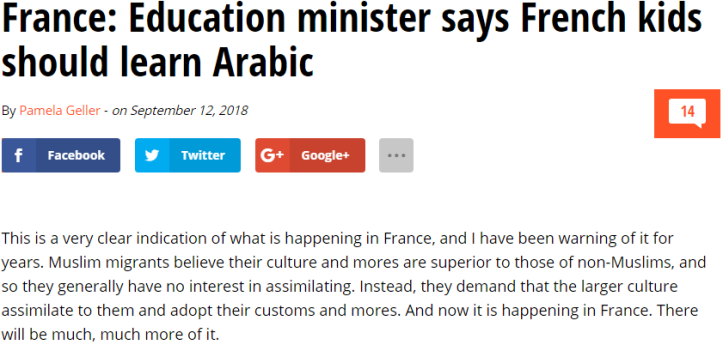
Students take three hours of foreign language instruction a week. When learning a living language, it can be English, Arabic, Spanish, German or any other language on the list.
Arabic was studied at the start of the 2012 school year by only 124 school children throughout France, which represents less than 0.1% (Eduscol.Education.fr). For more information, click here.
On the Ministry of National Education site, we learn that there is also an Arabic test since 2005 (in the entrance exams to the grandes écoles).
As you can see, Arabic is a language you can choose just like Italian, German or Chinese. It is already taught in many schools, but in no case is it mandatory
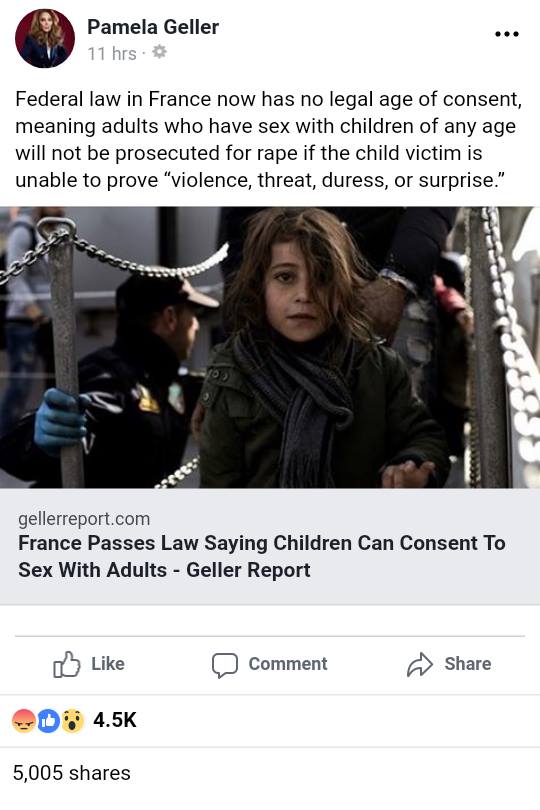 France has not legalised pedophilia.
France has not legalised pedophilia.
This was first shared by Your News Wire in the United States and then quickly picked up by Geller and spread all across the world and used as further evidence that France has fallen to Islam and live by Sharia.
France has other laws to protect children from sexual abuse.
Rape is considered a crime in France since 1810, and when a crime is reclassified as sexual assault or sexual abuse and thus considered as an offense, it minimises the seriousness of the facts for both victims and perpetrators which is the main argument here.
France’s definition of rape (viol) also varies from some other western countries, with the penal code stating that it is an assault that includes “any act of sexual penetration against the victim’s will.” It is defined as any act of sexual penetration committed against another person using violence, restraint, threats, or surprise.
A 2010 law specified that coercion “can be physical or moral,” adding: “Moral coercion can result from the age difference between an underage victim and the perpetrator, and from the legal or de facto authority that the perpetrator exerts over the victim.”
The promised consent age is not defined, but that does not mean sex between children and adults is suddenly legal. Instead, the existing laws were expanded and tightened. That age of consent does not exist in French legislation, and never previously existed.
In most countries, the age of consent is enshrined in law. It says that at a certain age, children are unable to consciously consent or reject sexual acts, so in any case it is considered as rape. Sexual acts with children are still punishable beyond the age of consent, and are therefore considered rape, but are handled differently from a legal point of view.
With an age of consent in place, any adults engaging in any sexual activity with a child under a certain age is, by default, rape. In the United States and other countries this crime is often referred to as statutory rape.
Under Article 222-24 of France’s penal code, rape of a child aged under 15 is considered an aggravated rape and is punishable by 20 years in prison. Under Article 222-22 of the French Criminal Code it defined the term “rape”, namely as sexual assault by force, coercion, threat or surprise.
In addition, in the legal summary 2010-121, incest and rape are dealt with in more detail when, for example, there is a moral constraint on the minor victim by an older relative or guardian. In such cases, the penalty can also double.
The new law adds a paragraph to article 222-22, stating that sexual acts on a child under the age of 15 should be considered a moral compulsion, since children below this age usually lack the judgment or understanding of such things have actions.
Penalties for “sexual offenses” are increased, including sexual acts on children under the age of 15 who can not be proven to have moral or physical coercion (as in the case above). These now amount to 7 years in prison and a fine of 150,000 euros.
The law has not changed, when it was promised to have a legal age of consent. A call for French legislators to introduce a legal age under which sexual consent cannot be presumed. Statutory rape is not the same as rape. The key difference between statutory rape and rape is that the only deciding factor between legal sexual activity and statutory rape is age – which again, the French penal code does not take into account the legal consent age while devising laws for statutory rape.
Next we see this little veiled girl appearing in a Gap Kids campaign:
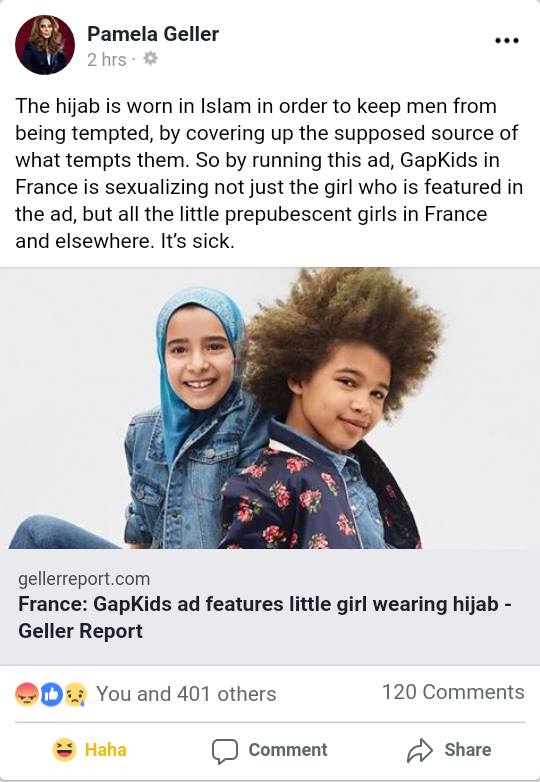
This ad was not even a French advertisement. Gap kids launched a campaign in the United States for the start of the school year.
This wasn’t designed specifically for the French public, contrary to what Geller says. Gap sites in other countries, such as the Italian or British page, also relay advertising. This is an English-language campaign broadcast internationally. The children are also not professional models, but pupils from a primary school in Harlem, New York.
The French website:
“This season, GapKids encourages children to reconnect with school by celebrating “differences” and offering them new sources of inspiration! Summer may be coming to an end, but autumn is a special time to reconnect, celebrate “differences” and find new inspirations. Our campaign is being carried by children from PS13 in Harlem, New York, and we are using their strengths and creativity to achieve something truly incredible!”
Source (in French): Does a veiled little girl appear in a French advertisement for Gap?
Next on the list…
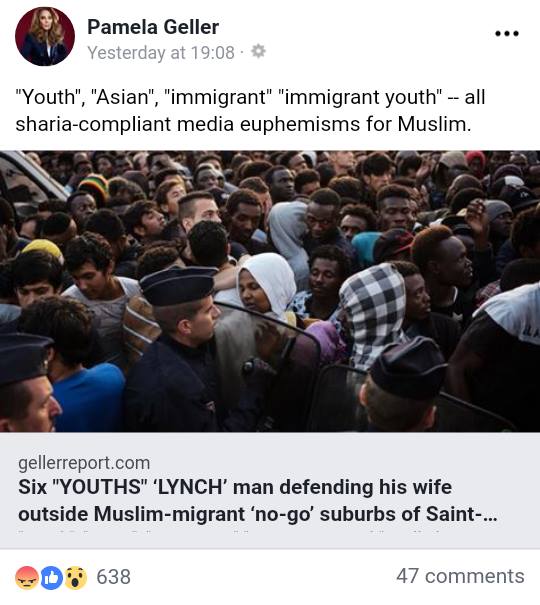
Posting the name of the alleged perpetrator(s), additional accusations, and outright errors, violates ethical standards in French journalism which says that one should be extremely careful with posting the name(s) of a suspect(s) that has not yet been convicted.
Some journalistic codes of ethics also include a concern with discriminatory references in news based on race, religion, sexual orientation, and physical or mental disabilities.
The Parliamentary Assembly of the Council of Europe approved in 1993 Resolution 1003 on the Ethics of Journalism, which recommends that journalists respect the presumption of innocence, in particular in cases that are still sub judice.
It has nothing to do with Muslims.
Related: The Myth of No-Go Zones in France
Some truly select content on this site, saved to bookmarks .
LikeLike
I enjoy the efforts you have put in this, regards for all the great blog posts.
LikeLike
I see something truly special in this site.
LikeLike
I dugg some of you post as I cogitated they were extremely helpful very useful
LikeLike
I truly appreciate this post. I have been looking everywhere for this! Thank goodness I found it on Bing. You have made my day! Thank you again!
LikeLike
Hello,I love reading through your blog, I wanted to leave a little comment to support you and wish you a good continuation. Wishing you the best of luck for all your blogging efforts.
LikeLike
I’ve been absent for some time, but now I remember why I used to love this website. Thanks, I’ll try and check back more frequently. How frequently you update your web site?
LikeLike
It’s difficult to find well-informed people with
this subject, however, you look like you know what you’re talking about!
Thanks
Visit my site – AllanAJardin
LikeLike
I realize this website gives quality dependent articles and additional material, can there be almost
every other web site which presents these things in quality?
Feel free to surf to my web site … ElvinCKrejci
LikeLike